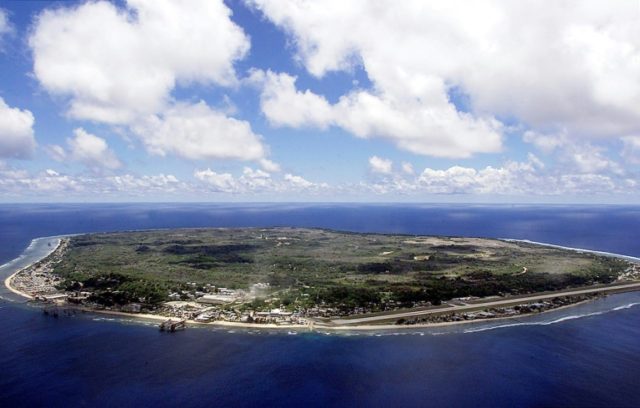China’s delegation angrily walked out of the Pacific Islands Forum on Tuesday when the host of the meeting, President Baron Waqa of Nauru, refused to allow Chinese representative Du Qiwen to deliver a speech on global warming.
China is accusing Nauru of treating their representative disrespectfully, while Nauru accuses Beijing of attempting to bully Pacific island nations. Most observers see the real issues as China’s thirst for regional power and Nauru’s alliance with Taiwan.
The 2018 Pacific Islands Forum (PIF) is being held on Nauru, which covers about eight square miles of land area and has a population of just 11,000. Even so, Nauru is not the smallest of the 18 participants in the event. That honor goes to Niue, which has only 1,600 citizens. (The largest participant, as geography aficionados might guess, is Australia.)
Various observers and partner nations are also invited to send representatives, including the United Nations, the World Bank, the United States, and China.
Much attention has been paid to Nauru’s selection as the host of this year’s forum because the island, currently celebrating its 50th year of independence, has a spotty economic and political history. In the past, Nauru has been accused of laundering money for Russian gangsters and selling passports to shady characters. At the moment, it generates much of its national income by warehousing 900 refugees for Australia in notoriously poor living conditions. The island’s government has been criticized for corruption and lack of transparency to the press.
As Chinese media rarely fail to note, Nauru diplomatically recognizes Taiwan despite China’s efforts to isolate and delegitimize the island nation. Even before the Pacific Islands Forum began, Nauru enraged Beijing by refusing to stamp the diplomatic passports of the Chinese delegation. China’s representatives were allowed to enter the island using their personal passports.
Several island nations with strong diplomatic and financial ties to China threatened to boycott the forum in response to this perceived slight. Nauru ultimately compromised by allowing the Chinese delegates to use their visa-acceptance letters in lieu of passports.
On Tuesday, Chinese representative Du Qiwen, the Chinese ambassador to Fiji, indicated he wanted to address the PIF about climate change. President Waqa refused, stating that China’s representative was insulting the assembled nations by demanding to speak before all of the actual attendees had their time on stage.
“He insisted, and was very insolent about it, and created a big fuss and held up the meeting of leaders for a good number of minutes when he was only an official. Maybe because he was from a big country he wanted to bully us,” Waqa said on Tuesday.
“Would he behave like that in front of his own president? I doubt it,” Waqa said of the Chinese representative at a press conference on Wednesday.
“He disrespected the Pacific, the forum island leaders and other ministers who have come to join us in our territory,” Waqa continued. “Are you kidding? Look at him, he’s a nobody. He’s not even a minister and he’s demanding to be recognized and to speak before the prime minister of Tuvalu. Is he crazy?”
Waqa demanded a formal apology from China and vowed to bring up the incident at every United Nations event and international meeting until he receives satisfaction. PIF members are also discussing plans to shift important business between island nations to events where foreign observers will not be invited.
“Never mind they are bigger than us, but they should not disrespect us,” Waqa said of China.
“I have to be strong for our members because no one is to come and dictate to us. If you listen to the retreat today, even their friends do not agree with their action. They were disappointed,” he asserted.
The Chinese Foreign Ministry responded by sneering about Nauru’s “so-called diplomatic ties” with Taiwan and denounced the treatment of its delegation as a “despicable farce.”
The Foreign Ministry threw in some threats about Taiwan: “Any attempt to create ‘two Chinas’ or ‘one China, one Taiwan’ will be rejected and is doomed to fail. Our advice for Nauru is that it should have a clear grasp of the overarching trend, correct its mistakes and stop working against the trend of the times.”
Having attempted to bully Nauru out of supporting Taiwan, Foreign Ministry spokeswoman Hua Chunying promptly insisted “Nauru is making a fuss out of nothing by accusing China of bullying small countries.”
China’s state-run Global Times on Wednesday applauded the Chinese delegation for walking out of the PIF “after being badly treated by the host country.”
The Global Times quoted Foreign Ministry spokeswoman Hua Chunying and others chastising Nauru for its wrong thinking and stubborn refusal to see that benevolent China has everyone’s best interests at heart.
“This is absolutely ridiculous,” Hua said, noting that the recent Beijing Summit of the Forum on China-Africa Cooperation shows China greatly cares about the equality of all countries, no matter how big or small. “Only by respecting yourself can you win the respect of others.”
“Nauru’s president is unbelievably ignorant of the one-China principle, which is a consensus of international society,” said Li Haidong, a professor at the China Foreign Affairs University. China was invited to attend the forum, but Waqa’s behavior was irrational, rude and did not accord with his position as a president, Li said.
Yu Lei, a research fellow at the Australian Studies Center at Beijing Foreign Studies University, told the Global Times on Wednesday that Waqa’s claim does not accord with China’s “diplomatic bible,” which emphasizes peaceful coexistence, treating all other countries equally and not interfering with other countries’ domestic affairs.
The Global Times tirade concluded by insinuating that some sinister unnamed Western country probably prodded Nauru into disrespecting China as one of its “little tricks” to counter “China’s growing influence in the Southern Pacific region.”

COMMENTS
Please let us know if you're having issues with commenting.